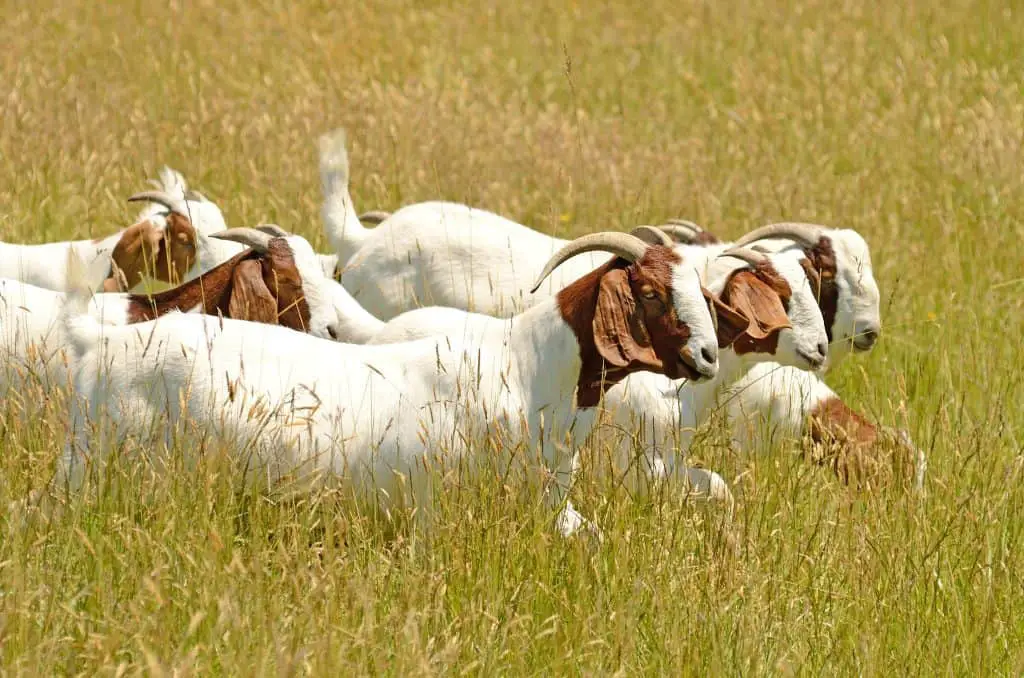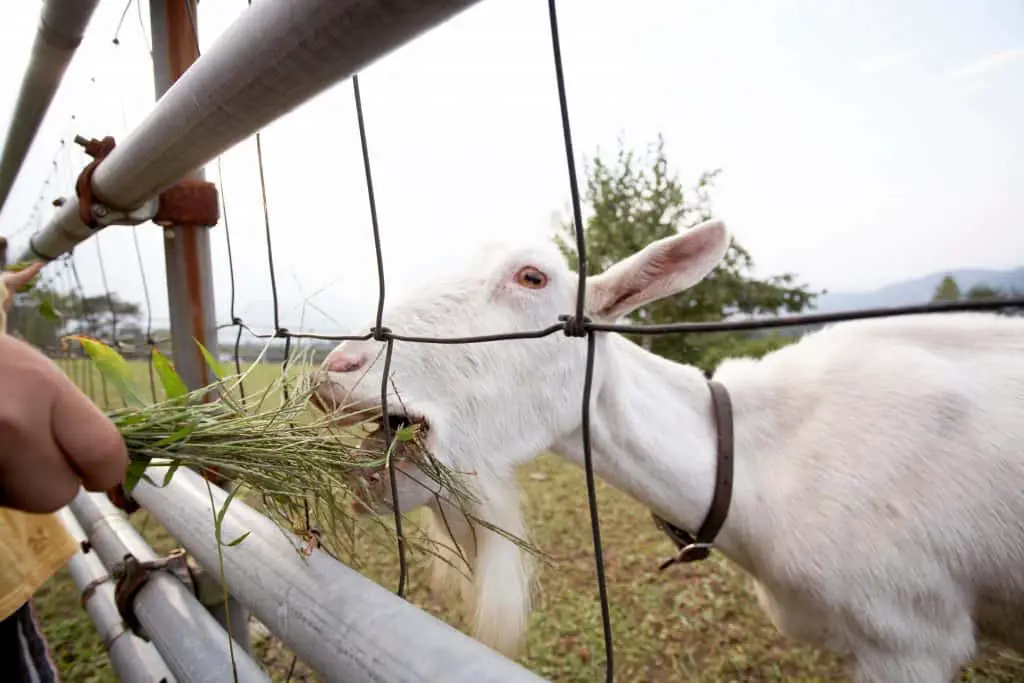Goats are a great addition to a homestead or farm. If you have a goat or are planning on getting one, you may be wondering about how much you can feed them and if it is possible to overfeed them.
Goats can overeat. If goats have eaten too much food, they can experience bloat, diarrhea, or scours. Overeating may require medical attention. Eating too much can result in a goat’s death due to dehydration or overeating disease.
Naturally, a goat owner wants to make sure their goat’s nutritional needs are met and that they are eating enough food. However, sometimes it can be challenging to know whether your goat is overeating, what they should and shouldn’t eat, as well as how to feed them.
How to Know If Your Goat Is Eating Too Much

There are different telltale signs to look out for if you want to know if your goat is overeating. Goats tend to eat too much grass, hay, and grains, which wreaks havoc on their digestive system and causes the following ailments:
- Bloating
- Diarrhea or Scours
- Overeating Disease
Bloating
One way you can tell that your goat has overeaten is by bloating. Bloating occurs when gas forms in bubbles that are too small for the goat to release naturally.
Bloating manifests physically. According to an article written by Jenniffer Sartell, a professional homesteader, the symptoms of bloating in a horse are:
- The left side of the horse (which is the side of the rumen) is sticking out much further than the right side.
- The horse’s abdomen feels like a tight hollow drum when tapped.
- Your horse is grinding its teeth, pawing, moaning, or resting its head against fences. These are signs your goat may be in pain.
You can prevent your goat from bloating by providing them with baking soda in a feeder. Baking soda helps to regulate their digestive system, and goats instinctively will consume it as needed. (Source: MannaPro)
Scours (Diarrhea)
Another symptom of your goat eating too much is the scours or diarrhea. Scours isn’t only caused by overeating. Many things, such as stress, can also cause scours. However, if you know your goat ate too many grains, this is likely the cause of your horse’s scours.
Grains tend to overload their digestive system if goats eat too much of it. Goats can also get scours from hay or grains because it upsets the rumen (a section of the digestive system). In addition to that, switching them from browner hay to greener hay too quickly can also give them scours.
The symptoms of scours are:
- Stool that is not clumped, round, or small
- Stool that is not the usual brown but is instead ranged in color from white to watery brown.
(Source: MannaPro)
Scours can cause dehydration, which causes the following symptoms:
- Weakness
- Sunken eyes
- Dry nose
- Pale and sticky gums
- Weight loss
- Tenting when the skin is pinched at the neck
Goats can be fed electrolytes if they have dehydration. Electrolytes refer to many different substances that will help goats suffering from dehydration.
The following electrolytes help goats with various body functions like maintaining fluid balance, regulating blood pH, and supporting the immune and digestive systems:
- Sodium
- Dextrose (glucose)
- Sodium bicarbonate
- Direct-fed microbials or probiotics
- Prebiotics
- Glycine
(Source: Sav A Calf)
You can feed your goat electrolytes by mixing a packet of electrolytes with some water and fed to them between milk or milk replacer feedings. Dehydration caused by scours (or any other factor) may require medical attention. If you have a young goat that has scours, is refusing to feed, and is lethargic, take them to the vet. (Source: Arizona Exotic Animal Hospital)
Overeating Disease
Enterotoxemia, also known as the overeating disease, it can be hard to spot and is characterized by sudden death within twelve hours.
Other signs and symptoms of overeating disease are:
- Diarrhea (scours)
- Loss of appetite
- Abdominal discomfort
Overeating disease is caused when a bacterium called Clostridium perfringins, which is found in the digestive tract, produces deadly toxins. Goats can develop this disease if they eat too much grain or drink too much milk.
To prevent overeating disease, it’s best to get your goats vaccinated every six months, Switch slowly between feeds and limit grazing time on lush pastures. (Sources: Umass and SheepandGoat)
How to Feed Your Goat

Goats can be fed in a variety of ways. One way you can feed a goat is by allowing them to graze. With grazing, you allow your goats to roam around your homestead or pasture and eat what they find.
Goats are natural grazers. However, allowing your goat to partake in continuous grazing may not be ideal. For instance, some plants, such as switchgrass, big bluestem, indiangrass, and johnsongrass, aren’t suitable for continuous grazing.
There are several ways to manage grazing. The controlled methods include:
- Strip Grazing – Strip grazing involves the use of electric fences to create boundaries around where the goat should be feeding.
- Controlled Grazing – This method involves allowing the goat to graze for a short time.
(Source: Extension)
In addition to grazing, you can opt to buy feed for your goat. It’s recommended that you have containers to store feed, water, and minerals for your goats.
You can also feed your goats by buying or making various feeders. The type of feeder you would buy depends on what you’ll be feeding the goats. For example, if you plan on feeding them hay, then you can make a hay feeder, buy one at a farm supply store, or order one online.
You can make a hay feeder using pliers and some fence wire. The steps involved are:
- Cut the edge of the wire off.
- Cut off a piece of the fence wire and make it flat. You can do that by stepping on it.
- Bend it into a rectangle.
- Cut off the excess wire.
- Hoist it somewhere where the goats can reach it then fill it with hay.
(Source: Potagergirl)
If you don’t want to make a hay feeder, you can buy a highly-rated one online like these two:
What Goats Eat
There is a wide variety of foods goats can eat. Goat owners do have to pay special attention to how much the goat is eating so that the goats don’t overeat and get sick or eat something that isn’t good for them. One crucial thing to remember is that if you’re changing your goat’s diet, it has to be gradual. A sudden change in diet is likely to upset their digestive system, which can result in serious problems.
The following foods are traditional goat food:
- Grains – Grains aren’t a requirement for goats; however, they can provide them with extra nutrients, especially for a goat nursing multiple kids or if there is inclement weather. If the goat eats too many grains, it may be at risk for developing the overeating disease or other serious digestive issues.
- Hay – Hay, which can be grass or a legume, is vital for goats to keep a healthy digestive tract and is the primary food source for goats. Grass hay is excellent for protein and energy, while legume hay provides more protein plus vitamins and minerals for the goat. Goats typically eat about 3 pounds of hay per day.
- Chaffhaye – Chaffhaye is a combination of alfalfa hay that was cut early, mixed with molasses, and had Bacillus subtilis added. Bacillus subtilis is a bacterium that aids in digestion. Chaffehaye is more nutrient-rich than regular hay.
(Source: Hay Manager)
Goats may also eat food from your compost or kitchen scraps as well as fruits and vegetables, such as:
- Watermelon
- Peaches
- Pumpkin
- Celery
- Grapes
- Carrots
(Sources: Animals.Mom.Me and Manna Pro)
In Conclusion
In conclusion, you can overfeed your goat. Goats can overeat food and suffer awful consequences. Make sure you are well versed in what they can and can’t eat and monitor how much they are eating. It’s also not a bad idea to have your vet on speed dial, just in case!

Related Posts:
Raising Goats on your Homestead
How to Get a Goat to Drink More Water: A Practical Guide


